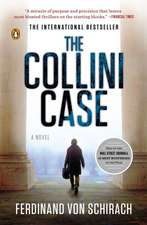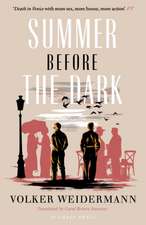Crime and Guilt
Autor Ferdinand Von Schirach Traducere de Carol Brown Janewayen Limba Engleză Paperback – 30 iun 2012
In “Fähner,” a small-town physician and avid gardener betrays little emotion when he takes an ax to his wife’s head, an act that shocks the locals but provides a
long-awaited reprieve for the good doctor. Abbas, a Palestinian refugee who is cornered into a life of crime, finds true love and seemingly a saving grace with a beautiful student named Stefanie in “Summertime.” But when she is viciously murdered in a hotel room after having been paid to sleep with one of the country’s wealthiest men, is Abbas to blame or is it the man who seems to have it all? And in the startling story “Love,” a young man’s infatuation with his girlfriend takes a grisly turn as he comes to grips with his unconventional—and uncontrollable—impulses to truly know a woman.
“Guilt,” writes von Schirach, “always presents a bit of a problem.” In this beautifully nuanced and telling collection, guilt is indeed never as clear-cut as the crime, and justice is more nebulous still.
Preț: 94.41 lei
Nou
Puncte Express: 142
Preț estimativ în valută:
18.08€ • 18.63$ • 15.15£
18.08€ • 18.63$ • 15.15£
Carte disponibilă
Livrare economică 03-17 februarie
Preluare comenzi: 021 569.72.76
Specificații
ISBN-13: 9780307740939
ISBN-10: 0307740935
Pagini: 286
Dimensiuni: 123 x 189 x 17 mm
Greutate: 0.2 kg
Editura: VINTAGE BOOKS
ISBN-10: 0307740935
Pagini: 286
Dimensiuni: 123 x 189 x 17 mm
Greutate: 0.2 kg
Editura: VINTAGE BOOKS
Notă biografică
Ferdinand von Schirach was born in Munich in 1964. Since 1994, he has worked as a criminal defense lawyer in Berlin. Among his clients have been the former member of the Politburo Günter Schabowski, the former East German spy Norbert Juretzko, and members of the underworld.
Extras
Fähner
Friedhelm Fähner had spent his whole working life as a GP in Rottweil, 2,800 patients with medical insurance processed every year, doctor’s office on the main street, chairman of the Egyptian Cultural Association, member of the Lions Club, no criminal offenses, or even minor infringements. Besides his house, he owned two rental properties, a three-year-old E-Class Mercedes with leather upholstery and air-conditioning, approximately 750,000 euros in bonds, and a capital-sum life-insurance policy. Fähner had no children. His only living relative was his sister, six years younger, who lived in Stuttgart with her husband and two sons. Fähner’s life wasn’t anything that gave rise to stories.
Until the thing with Ingrid.
Fähner was twenty-four when he met Ingrid at the party to celebrate his father’s sixtieth birthday. His father had been a doctor in Rottweil, too.
As a town, Rottweil is bourgeois to the core. Any non-inhabitant will be vouchsafed the information, willy-nilly, that the town was founded a thousand years ago and is the oldest in Baden-Württemberg. And indeed you come across medieval oriel windows and pretty antique tavern signs from the sixteenth century. The Fähners had lived here forever. They belonged to the so-called first families of the town, known for their roles as doctors, judges, and apothecaries.
Friedhelm Fähner looked a little like the young John F. Kennedy. He had a friendly face, people took him to be carefree, and things always panned out for him. You had to look more closely to detect a certain sadness, some ancient dark shadow in his expression, not so uncommon in this land between the Black Forest and the mountains of Swabia.
Ingrid’s parents, who were pharmacists in Rottweil, took their daughter with them to the party. She was three years older than Fähner, a sturdy, big-breasted provincial beauty. Eyes of a watery blue, black hair, pale skin—she knew the effect she had on people. Her voice, high-pitched and strangely metallic, grated on Fähner. It was only when she spoke softly that her sentences found a melody of their own.
She had failed to complete high school and was working as a waitress. “Temporarily,” she said to Fähner. He didn’t care. In another area, and one that interested him much more, she was way ahead of him. Fähner had had only two sexual encounters with women; they had been more unsettling than anything. He promptly fell in love with Ingrid.
Two days after the birthday party, she seduced him at the end of a picnic. They lay in a hikers’ shelter and Ingrid did her stuff well. Fähner was so overwhelmed that only a week later he asked her to marry him. She accepted without hesitation: Fähner was what you’d call a good catch, he was studying medicine in Munich, he was attractive and caring, and he would soon be taking his first exams. But what attracted her most was his seriousness. She couldn’t put it into words, but she said to her girlfriend that Fähner would never walk out on her. Four months later, she moved in with him.
The honeymoon was a trip to Cairo, his choice. When people later asked him about Egypt, he said it floated free of the earth, even when he knew that nobody would understand what he meant. Over there he was the young Parsifal, his purity that of a holy fool, and he was happy. It was the last time in his life.
The evening before they flew back, they were lying in their hotel room. The windows were open; it was still too hot, the air a solid mass in the little room. It was a cheap hotel, it smelled of rotten fruit, and they could hear the sounds of the street below. Despite the heat, they had made love. Fähner lay on his back, watching the rotations of the ceiling fan, as Ingrid smoked a cigarette. She turned on her side, propped her head on one hand, and looked at him. He smiled. There was a long silence.
Then she began to tell her story. She told Fähner about the men who’d come before him, about disappointments and mistakes, but most of all about the French lieutenant who had gotten her pregnant, and the abortion that had almost killed her. She wept. Shocked, he took her in his arms. He felt her heart beating against his chest and was undone. She has entrusted herself to me, he thought.
“You must swear to look after me. You can’t ever leave me.” Ingrid’s voice trembled.
He was moved. He wanted to calm her. He said he’d already sworn to do this at the wedding ceremony in church. He was happy with her. He wanted—
She interrupted him brusquely, her voice rising and taking on its unmodulated metallic sheen. “Swear.”
And suddenly he understood. This was no conversation between lovers, under the fan in Cairo, with the pyramids and the stifling heat of their hotel room—all these clichés vanished in an instant. He pushed her away a little so that he could see her eyes. Then he said it. He said it slowly, and he knew what he was saying. “I swear.”
He pulled her close once more and kissed her face. They made love again. But this time it was different. She sat on top of him, took whatever she wanted. They were deadly serious, strangers to each other, and each of them was wholly alone. Afterward, he lay awake for a long time, staring at the ceiling. There had been a power cut and the fan had stopped revolving.
Naturally, Fähner passed his exams with distinction, completed his doctorate, and landed his first job in the Rottweil District Hospital. They found an apartment, three rooms, bath, view of the edge of the forest.
When his things in Munich were being packed up, she threw out his record collection. He didn’t realize this until they were moving into the new apartment. She said she couldn’t stand them—he’d listened to them with other women. Fähner was furious. They barely spoke to each other for two days.
Fähner liked Bauhaus clarity. She decorated the apartment in oak and pine, hung curtains at the windows, and bought brightly colored bed linens. He even accepted the embroidered coasters and the pewter tankards; he didn’t want to put her down.
A few weeks later, Ingrid told him she was bothered by the way he held his knife and fork. To begin with, he laughed and thought she was being childish. She reproached him with it again the next day, and then the days after that. And because she meant it, he took to holding his knife differently.
Ingrid pretended that he didn’t take out the garbage. He persuaded himself that these were merely teething troubles in their relationship. But soon she was accusing him of coming home too late because he’d been flirting with other women.
The reproaches became unending, until he was hearing them daily: He was disorganized. He dirtied his shirts. He crumpled the newspaper. He smelled bad. He thought only of himself. He talked nonsense. He was cheating on her. Fähner barely defended himself anymore.
After a few years, the insults began. Relatively measured at first, they then gained in intensity. He was a pig. He was torturing her. He was an idiot. Then came the scatological rants and the screaming. He gave up. He would get out of bed during the night and read science fiction. He went jogging for an hour every day, as he had done when he was a student. They had long since given up sex. He received approaches from other women, but he never had an affair. When he was thirty-five, he took over his father’s practice; when he was forty, he turned gray. Fähner was tired.
When Fähner was forty-eight, his father died; when he was fifty, it was his mother’s turn. He used his inheritance to buy a half-timbered house on the outskirts of town. The house came with a small park, a wilderness of shrubs, forty apple trees, twelve chestnut trees, and a pond. The garden became Fähner’s salvation. He ordered books, subscribed to specialist journals, and read everything he could lay his hands on about shrubs, ponds, and trees. He bought the best tools, informed himself about watering systems, and learned everything there was to learn with his customary systematic thoroughness. The garden blossomed, and the plantings became so famous in the neighborhood that Fähner saw people here and there among the apple trees taking photographs of them.
During the week, he spent long hours at his practice. Fähner was a painstaking and empathetic doctor. His patients thought highly of him; his diagnoses set the standard in Rottweil. He left the house before Ingrid woke up and didn’t return until after nine in the evening. He accepted the nightly barrage of reproaches at dinner in silence. Sentence by unvarnished sentence, Ingrid’s metallic voice laid down animosity after animosity like railroad tracks. She had grown fat and her pale skin had turned pink with the years. Her neck had thickened and begun to wobble, and she had developed a fold of skin at her throat that swayed in time to her outbursts. She became short of breath and had high blood pressure. Fähner got thinner and thinner. One evening when he blurted out that Ingrid might perhaps seek help from a psychiatrist who was a friend, she threw a frying pan at him and screamed that he was an ungrateful pig.
The night before Fähner’s sixtieth birthday, he lay awake. He had pulled out the faded photo from Egypt: Ingrid and himself in front of the Pyramid of Cheops, with a background of camels, scenic Bedouins, and sand. When she threw out their wedding albums, he had fished the picture back up out of the garbage. Since then, it had found a safe hiding place deep in the back of his closet.
In the course of this night, Fähner was forced to realize that he would remain an eternal prisoner until the end of his life. He had given his word in Cairo. And now, in the bad times, was when he had to keep it; there was no such thing as giving your word for the good times only. The photo swam before his eyes. He took off his clothes and stood naked in front of the bathroom mirror. He looked at himself for a long time. Then he sat on the rim of the bathtub. For the first time in his adult life, he cried.
Fähner was working in his garden. He was seventy-two now; he’d sold his practice four years before. As always, he had gotten up at six o’clock. He had left the guest room—in which he’d been living for years—very quietly. Ingrid was still asleep. It was a glowing September morning. The early mist had burned off and the air was clear and cold. Fähner was using a hoe to weed the ground between the autumn perennials. It was an activity both demanding and monotonous. Fähner was content. He looked forward to the coffee he would be drinking at nine-thirty, something he always did when he took his break. Fähner also thought about the delphiniums he’d planted early in the year. They would blossom for a third time late in the fall.
Suddenly, Ingrid yanked open the door to the terrace. She yelled that he’d forgotten once again to close the windows in the guest room, said he was a total idiot. Her voice cracked—the sound of pure metal fracturing.
Later on, Fähner would be unable to describe exactly what went through his mind at that moment. That something deep inside him had begun to glow with a hard, clear light. That everything had taken on a supernatural clarity under this light. That it was white-hot.
Friedhelm Fähner had spent his whole working life as a GP in Rottweil, 2,800 patients with medical insurance processed every year, doctor’s office on the main street, chairman of the Egyptian Cultural Association, member of the Lions Club, no criminal offenses, or even minor infringements. Besides his house, he owned two rental properties, a three-year-old E-Class Mercedes with leather upholstery and air-conditioning, approximately 750,000 euros in bonds, and a capital-sum life-insurance policy. Fähner had no children. His only living relative was his sister, six years younger, who lived in Stuttgart with her husband and two sons. Fähner’s life wasn’t anything that gave rise to stories.
Until the thing with Ingrid.
Fähner was twenty-four when he met Ingrid at the party to celebrate his father’s sixtieth birthday. His father had been a doctor in Rottweil, too.
As a town, Rottweil is bourgeois to the core. Any non-inhabitant will be vouchsafed the information, willy-nilly, that the town was founded a thousand years ago and is the oldest in Baden-Württemberg. And indeed you come across medieval oriel windows and pretty antique tavern signs from the sixteenth century. The Fähners had lived here forever. They belonged to the so-called first families of the town, known for their roles as doctors, judges, and apothecaries.
Friedhelm Fähner looked a little like the young John F. Kennedy. He had a friendly face, people took him to be carefree, and things always panned out for him. You had to look more closely to detect a certain sadness, some ancient dark shadow in his expression, not so uncommon in this land between the Black Forest and the mountains of Swabia.
Ingrid’s parents, who were pharmacists in Rottweil, took their daughter with them to the party. She was three years older than Fähner, a sturdy, big-breasted provincial beauty. Eyes of a watery blue, black hair, pale skin—she knew the effect she had on people. Her voice, high-pitched and strangely metallic, grated on Fähner. It was only when she spoke softly that her sentences found a melody of their own.
She had failed to complete high school and was working as a waitress. “Temporarily,” she said to Fähner. He didn’t care. In another area, and one that interested him much more, she was way ahead of him. Fähner had had only two sexual encounters with women; they had been more unsettling than anything. He promptly fell in love with Ingrid.
Two days after the birthday party, she seduced him at the end of a picnic. They lay in a hikers’ shelter and Ingrid did her stuff well. Fähner was so overwhelmed that only a week later he asked her to marry him. She accepted without hesitation: Fähner was what you’d call a good catch, he was studying medicine in Munich, he was attractive and caring, and he would soon be taking his first exams. But what attracted her most was his seriousness. She couldn’t put it into words, but she said to her girlfriend that Fähner would never walk out on her. Four months later, she moved in with him.
The honeymoon was a trip to Cairo, his choice. When people later asked him about Egypt, he said it floated free of the earth, even when he knew that nobody would understand what he meant. Over there he was the young Parsifal, his purity that of a holy fool, and he was happy. It was the last time in his life.
The evening before they flew back, they were lying in their hotel room. The windows were open; it was still too hot, the air a solid mass in the little room. It was a cheap hotel, it smelled of rotten fruit, and they could hear the sounds of the street below. Despite the heat, they had made love. Fähner lay on his back, watching the rotations of the ceiling fan, as Ingrid smoked a cigarette. She turned on her side, propped her head on one hand, and looked at him. He smiled. There was a long silence.
Then she began to tell her story. She told Fähner about the men who’d come before him, about disappointments and mistakes, but most of all about the French lieutenant who had gotten her pregnant, and the abortion that had almost killed her. She wept. Shocked, he took her in his arms. He felt her heart beating against his chest and was undone. She has entrusted herself to me, he thought.
“You must swear to look after me. You can’t ever leave me.” Ingrid’s voice trembled.
He was moved. He wanted to calm her. He said he’d already sworn to do this at the wedding ceremony in church. He was happy with her. He wanted—
She interrupted him brusquely, her voice rising and taking on its unmodulated metallic sheen. “Swear.”
And suddenly he understood. This was no conversation between lovers, under the fan in Cairo, with the pyramids and the stifling heat of their hotel room—all these clichés vanished in an instant. He pushed her away a little so that he could see her eyes. Then he said it. He said it slowly, and he knew what he was saying. “I swear.”
He pulled her close once more and kissed her face. They made love again. But this time it was different. She sat on top of him, took whatever she wanted. They were deadly serious, strangers to each other, and each of them was wholly alone. Afterward, he lay awake for a long time, staring at the ceiling. There had been a power cut and the fan had stopped revolving.
Naturally, Fähner passed his exams with distinction, completed his doctorate, and landed his first job in the Rottweil District Hospital. They found an apartment, three rooms, bath, view of the edge of the forest.
When his things in Munich were being packed up, she threw out his record collection. He didn’t realize this until they were moving into the new apartment. She said she couldn’t stand them—he’d listened to them with other women. Fähner was furious. They barely spoke to each other for two days.
Fähner liked Bauhaus clarity. She decorated the apartment in oak and pine, hung curtains at the windows, and bought brightly colored bed linens. He even accepted the embroidered coasters and the pewter tankards; he didn’t want to put her down.
A few weeks later, Ingrid told him she was bothered by the way he held his knife and fork. To begin with, he laughed and thought she was being childish. She reproached him with it again the next day, and then the days after that. And because she meant it, he took to holding his knife differently.
Ingrid pretended that he didn’t take out the garbage. He persuaded himself that these were merely teething troubles in their relationship. But soon she was accusing him of coming home too late because he’d been flirting with other women.
The reproaches became unending, until he was hearing them daily: He was disorganized. He dirtied his shirts. He crumpled the newspaper. He smelled bad. He thought only of himself. He talked nonsense. He was cheating on her. Fähner barely defended himself anymore.
After a few years, the insults began. Relatively measured at first, they then gained in intensity. He was a pig. He was torturing her. He was an idiot. Then came the scatological rants and the screaming. He gave up. He would get out of bed during the night and read science fiction. He went jogging for an hour every day, as he had done when he was a student. They had long since given up sex. He received approaches from other women, but he never had an affair. When he was thirty-five, he took over his father’s practice; when he was forty, he turned gray. Fähner was tired.
When Fähner was forty-eight, his father died; when he was fifty, it was his mother’s turn. He used his inheritance to buy a half-timbered house on the outskirts of town. The house came with a small park, a wilderness of shrubs, forty apple trees, twelve chestnut trees, and a pond. The garden became Fähner’s salvation. He ordered books, subscribed to specialist journals, and read everything he could lay his hands on about shrubs, ponds, and trees. He bought the best tools, informed himself about watering systems, and learned everything there was to learn with his customary systematic thoroughness. The garden blossomed, and the plantings became so famous in the neighborhood that Fähner saw people here and there among the apple trees taking photographs of them.
During the week, he spent long hours at his practice. Fähner was a painstaking and empathetic doctor. His patients thought highly of him; his diagnoses set the standard in Rottweil. He left the house before Ingrid woke up and didn’t return until after nine in the evening. He accepted the nightly barrage of reproaches at dinner in silence. Sentence by unvarnished sentence, Ingrid’s metallic voice laid down animosity after animosity like railroad tracks. She had grown fat and her pale skin had turned pink with the years. Her neck had thickened and begun to wobble, and she had developed a fold of skin at her throat that swayed in time to her outbursts. She became short of breath and had high blood pressure. Fähner got thinner and thinner. One evening when he blurted out that Ingrid might perhaps seek help from a psychiatrist who was a friend, she threw a frying pan at him and screamed that he was an ungrateful pig.
The night before Fähner’s sixtieth birthday, he lay awake. He had pulled out the faded photo from Egypt: Ingrid and himself in front of the Pyramid of Cheops, with a background of camels, scenic Bedouins, and sand. When she threw out their wedding albums, he had fished the picture back up out of the garbage. Since then, it had found a safe hiding place deep in the back of his closet.
In the course of this night, Fähner was forced to realize that he would remain an eternal prisoner until the end of his life. He had given his word in Cairo. And now, in the bad times, was when he had to keep it; there was no such thing as giving your word for the good times only. The photo swam before his eyes. He took off his clothes and stood naked in front of the bathroom mirror. He looked at himself for a long time. Then he sat on the rim of the bathtub. For the first time in his adult life, he cried.
Fähner was working in his garden. He was seventy-two now; he’d sold his practice four years before. As always, he had gotten up at six o’clock. He had left the guest room—in which he’d been living for years—very quietly. Ingrid was still asleep. It was a glowing September morning. The early mist had burned off and the air was clear and cold. Fähner was using a hoe to weed the ground between the autumn perennials. It was an activity both demanding and monotonous. Fähner was content. He looked forward to the coffee he would be drinking at nine-thirty, something he always did when he took his break. Fähner also thought about the delphiniums he’d planted early in the year. They would blossom for a third time late in the fall.
Suddenly, Ingrid yanked open the door to the terrace. She yelled that he’d forgotten once again to close the windows in the guest room, said he was a total idiot. Her voice cracked—the sound of pure metal fracturing.
Later on, Fähner would be unable to describe exactly what went through his mind at that moment. That something deep inside him had begun to glow with a hard, clear light. That everything had taken on a supernatural clarity under this light. That it was white-hot.
Recenzii
“Crime would command the attention due a carnival freak-show if von Schirach’s crisp, swift prose did not lend it such laconic authority. Save in the sparest of hints, he shuns forensic psychology. Each tale whips along, a shock at every turn, like some beast with eyes of red-hot coal panting down a forest track at night. For, courtroom procedure aside, the spirit of the German-language Märchen really drives this book: eerie tales of the uncanny, as practiced by Hoffmann, Kleist, the Grimms, and even Kafka.” —Independent (UK)
"Mesmerizing. . .a slim, utterly absorbing collection of 11 stories. . .told in a cool, patient voice that draws the reader in. Von Schirach guides us through the unpredictable sequences of events that can maneuver regular, flawed people into unbearable positions, leading them to abhorrent acts. . .[He] has the talent to dazzle." --New York Times Book Review
"An extraordinary book about ordinary crime, written with suspense, insight, and beautiful precision by an experienced defense attorney. An authentic thriller." --Bernhard Schlink, author of The Reader
"Mesmerizing. . .a slim, utterly absorbing collection of 11 stories. . .told in a cool, patient voice that draws the reader in. Von Schirach guides us through the unpredictable sequences of events that can maneuver regular, flawed people into unbearable positions, leading them to abhorrent acts. . .[He] has the talent to dazzle." --New York Times Book Review
"An extraordinary book about ordinary crime, written with suspense, insight, and beautiful precision by an experienced defense attorney. An authentic thriller." --Bernhard Schlink, author of The Reader









